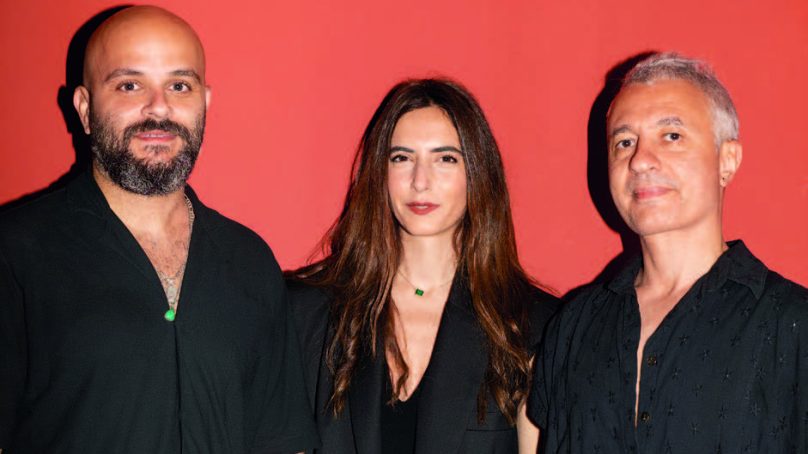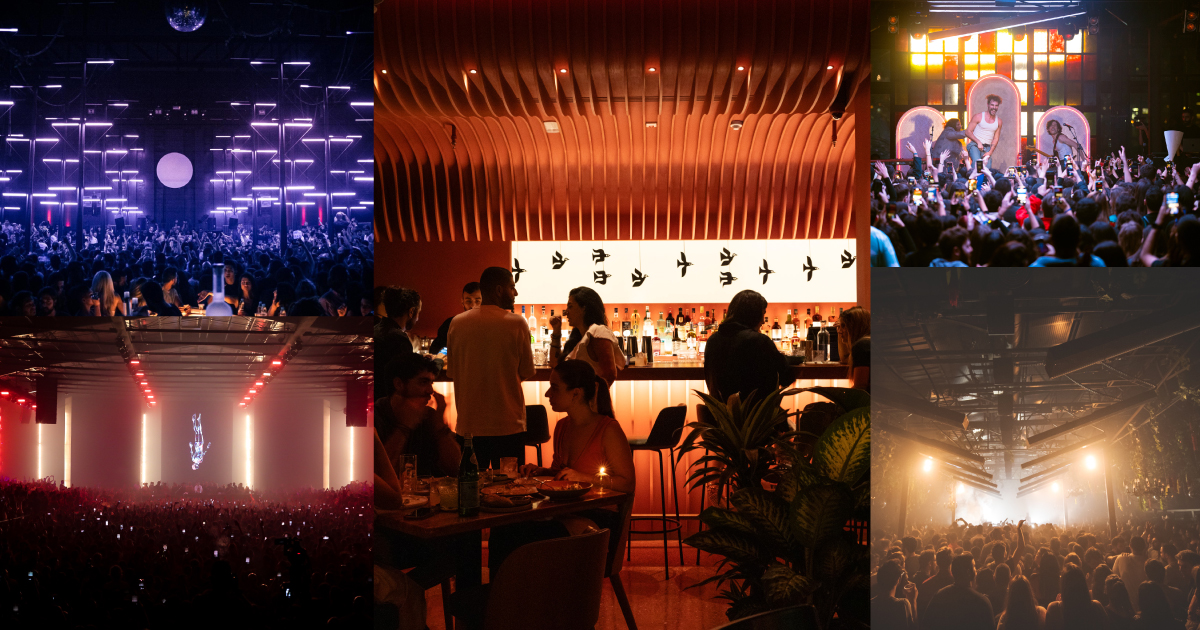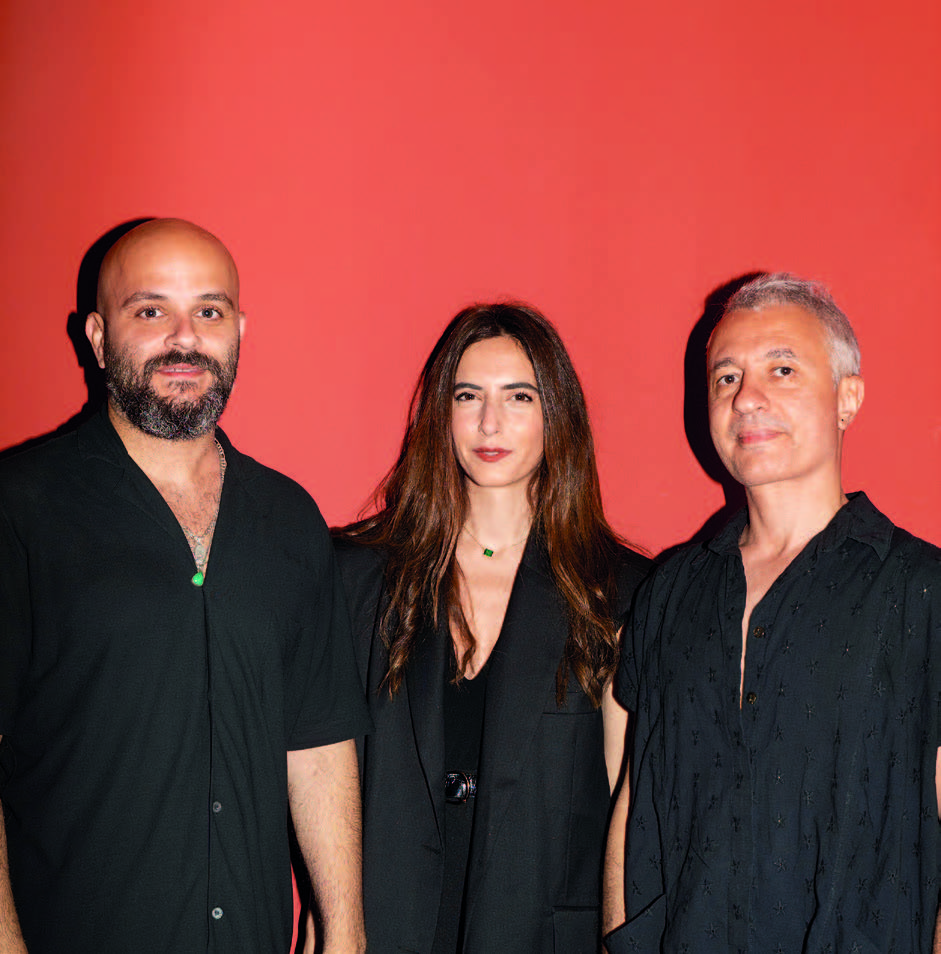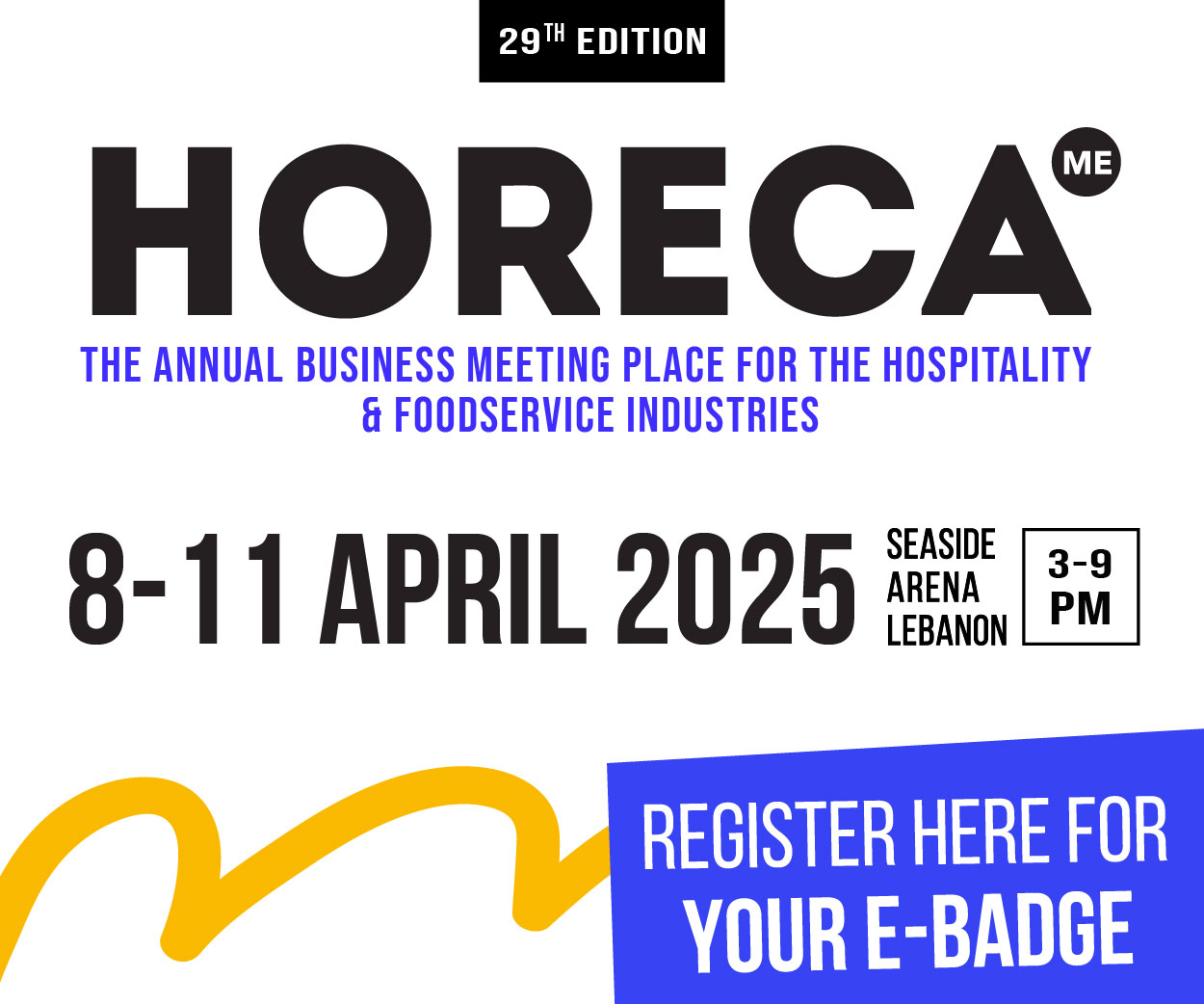

How have the years you’ve spent in various segments of the entertainment business shaped your approach at Factory People?
Jade: When I started collecting records as a teen, I never limited myself to any single genre. The band I was in – Blend – was focused on rock, while my personal productions went down a more electronic and dance route, but I’ve always been curious to explore anything that interests me. From my first club, The Basement, until today, this remains the foundation of every project or venue we build and every brand or party we launch – they are all inspired by a music movement, song or a design direction. The live-stage aspect will always be there.
Tala: As a graphic designer, creating spaces, brands and worlds around music that stand for something was always what I set out to do. This dream came true when we joined forces to create projects that are a source of inspiration for our audiences, and also a hub for artists, a space for forward-thinking design and a positive agent for change.
Wassim: Music was always the focal point for me, combined with creativity in parallel industries, as well as curiosity and the drive to learn. Jade and I share a similar introduction into the industry, since I was also in a rock band. I was lucky enough to tour internationally, which opened my eyes to the perception the world had of our region. This made me want to show how much culture and art we have here, and to try and add to the global conversation about nightlife and club culture. Meeting Tala and Jade, and collaborating on projects, convinced us that we belong together as a creative entity, and that’s how we formed Factory People.
Grand Factory is considered one of Beirut’s leading nightclubs. Can you share its backstory?
Jade: In 2011, I shut down The Basement even though it was still at its peak, so that I could focus more on my music, and started a fun weekly party series with my partner that moved around on Saturdays, titled ‘C U NXT SAT.’ Tala oversaw the party’s communication and art direction; together we’d started an audio-visual project called ‘The Middle Beast’ and there was no intention really to build clubs. We had also decided to move to Berlin, where we launched Riverside Studios with a German partner. We were going back and forth for ‘C U NXT SAT,’ but the party was growing and people were becoming hungrier for electronic music. We realized that we needed a fixed headquarters to sustain the business, so we started scouting for locations in Beirut. At the same time, I was looking for the right partners to operate the club, allowing us to focus on the creative side. I went to the heart of the industrial area, as I wanted something completely different, and we found our space in Karantina in early 2014. People tried to warn us that no one would go there, but we saw what we felt could be the future of clubbing.
Tala: Year on year, we kept evolving and building something new, from Reunion in 2016, the Factory Room revamp in 2017 and Soul Kitchen in 2018 to the Radiator Kinetic lighting installation in 2019. I’m proud that Grand Factory has consistently ranked in the top 100 clubs in the world since its inception, and that the club is now one of Beirut’s most iconic venues, with some of the world’s top DJs, including Rampa and Patrice Baumel, still describing it as one of their favorite clubs.
Which changing trends on the nightlife scene did you consider when setting up AHM?
Wassim: AHM was a necessary next step for our group’s development. Grand Factory was growing year on year with us and with our crowd – we were going bigger with our programming and opening room after room – and we realized in 2016 that we needed to operate it fully and focus more on Beirut than Berlin. However, there was a seasonal limitation, since no one wanted to be indoors during the summer, and, with summer the high season of the industry, we had to capitalize on this by building another standalone, open-air iconic club. With AHM, we were able to take everything we’d learned from three seasons at Grand Factory and fully elevate the offering.
How do you balance navigating the competitive nightlife scene with maintaining a sustainable business model?
Jade: Trends come and go, and so do competitors – these are constants in this industry. It’s usually a great thing, since competition allows you to think differently and diversify, but the downside is that in Lebanon the environment is fierce as we do not have an influx of tourists and new faces. In fact, the opposite is true, with Lebanese, who are our main target audience, leaving due to the crisis. In short, everyone in Lebanon is fighting for a piece of a shrinking pie. We believe that our solid foundations, remaining innovative and staying ahead of the game are what will help our business to sustain itself. There are also two elements that set us apart from other entertainment companies. Firstly, we are a brand and strategy-building company, with management heavily focused on design, thinking and marketing strategies. Wassim and Samer Makarem, Factory People’s general manager, are marketing specialists, while Tala’s roots are in design and I have an engineering background. We use these tools to run our company according to a vision, having successfully launched 21 highly relatable brands across the market. We work with an integrated creative approach that allows our brands to really connect and grow, along with their target audience. Our second major USP is that beyond the club culture, Factory People is a creative space at the heart of promoting original alternative talent from the region and beyond, both directly, through our artist development programs, such as the BBX, and indirectly, through our concert series and parties. As young artists, we needed to learn, exchange, perform and express ourselves. Bringing these experiences to the business means we don’t look at the competitive landscape solely from a nightlife-clubbing perspective, but instead, promote the future today and that’s what separates us from typical club setups.
What criteria do you consider when it comes to creating meaningful connections with your patrons?
Tala: We always consider how our brands can grow in the long run, rather than simply engaging in a quick transactional relationship with our guests. What’s most important for us is to ensure that all our guests have a fantastic experience that keeps evolving over time, and we couple this with community outreach and building real relationships with our guests, before and after the party. Nothing makes me prouder than when people come up to me and say things like they’ve been attending all our events since The Basement days and that Grand Factory feels like home.
You are known for championing social responsibility. What are your latest initiatives in this area?
Tala: Our goal has never been to build clubs, rather we use our venues and online presence as platforms that can contribute to our community. Our venues have long been open for cultural exchange, workshops, concerts and artist development programs. We also leverage our network and our access to young people to spread the right messages and inspire. Last year, we launched FNL for Lebanese musicians, to keep supporting a scene that has been left to fend for itself. This year we are looking to bring back BBX (Beirut Berlin Express), giving Lebanese musicians the chance to win a one-month artist’s residency at Riverside Studios and work on their albums long term. Our belief in the future of the original alternative Arabic music scene is a big part of our ethos.
How do you see the industry evolving?
Jade: As we continue to enhance our events and productions, we will be building more intimate experiences. We recently launched our long-awaited Soul Kitchen restaurant in Dubai, with an innovative menu. To our delight, it’s getting rave reviews. Seven Management was the perfect partner for Parasol since there’s a long-standing history and friendship between us. The location in Beirut Waterfront meant we were able to expand further into food and daytime gatherings in the heart of the city. On another tangent, we are looking to give our guests an even more enjoyable experience by integrating key tech solutions that use AI, data-driven personalization and contactless services.
What plans do you have in the pipeline?
Jade: In Lebanon, we will be opening the new and iconic AHM, which spans 4,000 m2 and will comprise different spaces that interact together seamlessly. We also hope to open a standalone Soul Kitchen restaurant in Beirut in Q2, 2024. In the UAE, we will soon be starting the new season of Hot Mess at a beautiful outdoor location, and, in 2024, we are opening a fresh version of Reunion and a Cafe Bistro near Soul Kitchen, while also launching a new food concept based on our Habibi Club parties. Elsewhere, in Egypt, our AHM summer pop-up will continue with our partners VLS, and, additionally, we’ll be doing a few ‘2ND Sun’ events in Cairo, El Gouna and Sahel.

Jade, CEO, Tala Mortada, chief creative officer, and Wassim Bou Malham chief strategy officer
Factory People
















